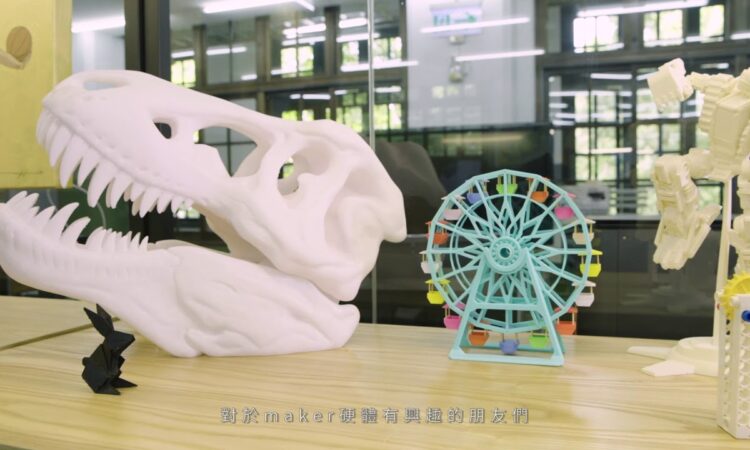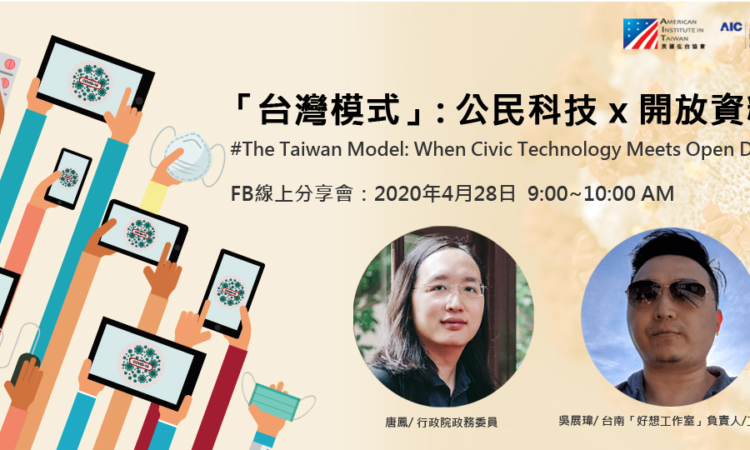如果您對下列項目有興趣,請與美國資料中心聯絡。電話:2723-3959 轉 202。
六月十八日(星期一) 端午節,放假。
To receive or reserve any of these items, please contact Information Resource Center at 2723-3959, ext. 202 or aitirc@mail.ait.org.tw.
June 18 (Monday) Dragon Boat Festival. Close.
1. 「美國與台灣:恆久的夥伴關係」, 美國在台協會主席莫健於史丹佛大學之演說。
The United States and Taiwan: An Enduring Partnership, Remarks by AIT Chairman James Moriarty at Stanford University. 
OT-1807, May 4, 2018, 8 pages.
“Taiwan’s transformation from an island ruled by martial law to a beacon of democracy is one of the great stories of the late 20th and early 21st centuries. We should all cherish the powerful example that Taiwan offers to the Indo-Pacific region and the world.” (From AIT)
2. 「立穩根基,共創未來:AIT@40 — 1979 年後美台關係展」, 美國在台協會處長梅健華開幕典禮致詞。
“Strong Foundation, Bright Future: AIT@40 U.S.-Taiwan Relations Since 1979”, Remarks by AIT Director. 
OT-1809, May 31, 2018, 1 pages.
“In this exhibition, AIT has brought together documents, artifacts, interviews, hundreds of photos, and even augmented and virtual reality features to tell the story of AIT’s role in forging U.S.-Taiwan relations over the past 40 years. It shows the breadth and depth of the exchanges and engagement that the U.S. and Taiwan have shared since 1979.” (From AIT)
3. 美國在台協會處長梅健華記者會致詞。
Remarks by AIT Director Kin Moy at AIT Press Conference. 
OT-1808, May 21, 2018, 2 pages.
“I am pleased to announce that on June 12, the American Institute in Taiwan will hold a ceremony to dedicate AIT’s new office complex in Neihu.” (From AIT)
4. Cordesman, Anthony H.
Improving Stability in the Arab World. 
Center for Strategic and International Studies, May 14, 2018, 39 pages.
“The Arab world is also still imprisoned by the myth of the Arab nation. There is a real cultural affinity among Arab states – in cultural, linguistic and to some extent religious terms. At the same time, the causes of instability and development needs vary sharply by nation even among close neighbors. Annex A to this report provides a summary “scorecard” illustrating just how serious these differences are, and it makes it brutally clear that there is no Arab nation – or common basis for dealing with instability in the Arab world. It is equally clear that trying to export the responsibility for instability to other countries, or explain failures with conspiracy theories has done the Arab world immense damage and represents a series of major failures in leadership.” (From CSIS)
5. Jervis, Robert and Mira Rapp-Hooper.
Perception and Misperception on the Korean Peninsula. 
Foreign Affairs, May/June Issue 2018, 10 pages.
“North Korea’s leader, Kim Jong Un, has declared his country’s nuclear deterrent complete and, despite his willingness to meet with U.S. President Donald Trump, is unlikely to give it up. Yet Washington continues to demand that Pyongyang relinquish the nuclear weapons it already has, and the Trump administration has pledged that the North Korean regime will never acquire a nuclear missile that can hit the United States. The result is a new, more dangerous phase in the U.S.–North Korean relationship: a high-stakes nuclear standoff.” (From Foreign Affairs)
6. Nurkin, Tate.
China’s Advanced Weapons Systems: Executive Summary.(PDF) 
The U.S.-China Economic and Security Review Commission, May 12, 2018, 11 pages.
“The report examines five categories of China’s advanced weapons systems and artificial intelligence applications for national defense. The report also assesses the implications of China’s advanced weapons programs for the United States and its allies and provides recommendations. (From the U.S.-China Economic and Security Review Commission)

7. Fefer, Rachel F. and others.
Digital Trade and U.S. Trade Policy. 
Washington, D.C.: Congressional Research Service, May 11, 2018, 43 pages.
“This report discusses the role of digital trade in the U.S. economy, barriers to digital trade, digital trade agreement provisions, and other selected policy issues.” (From CRS report)

8. Doherty, Carroll.
Key findings on Americans’ views of the U.S. political system and democracy. 
Pew Research Center, April 26, 2018, 4 pages.
“The strength and stability of democracy has become a subject of intense debate in the United States and around the world. But how do Americans feel about their own democracy? As part of a year-long effort to study “Facts, Trust and Democracy” Pew Research Center has conducted a major survey of public views of the U.S. political system and American democracy. The survey finds that while Americans are in broad agreement on important ideals relating to democracy in the U.S., they think the nation is falling short in realizing many of these ideals.” (From Pew Research Center)
9. Mach, Annie L. and Bernadette Fernandez.
Federal Requirements on Private Health. 
Washington, D.C.: Congressional Research Service, May 1, 2018, 26 pages.
“The first part of this report provides background information about health plans sold in the PHI market and briefly describes state and federal regulation of private plans. The second part summarizes selected federal requirements and indicates each requirement’s applicability to one or more of the following types of private health plans: individual, small group, large group, and self-insured.” (From CRS report)
10. Gordon, David and others.
U.S. Geopolitical Challenges and Opportunities in the Era of Lower Oil Prices. 
Center for a New American Security, April 26, 2018, 28 pages.
“The shift in power balance from producers to consumers will also create new challenges for the United States. U.S. policymakers will have to find ways to support producer countries facing instability in an era of declining oil revenues. U.S adversaries are taking advantage of this new uncertainty. Russia, for example, has used offers of budgetary support to extend its reach into unstable countries like Venezuela.” (From Center for a New American Security)
11. Holt, Mark.
Civilian Nuclear Waste Disposal. (PDF) 
Washington, D.C.: Congressional Research Service, May 9, 2018, 47 pages.
“Management of civilian radioactive waste has posed difficult issues for Congress since the beginning of the nuclear power industry in the 1950s. Federal policy is based on the premise that nuclear waste can be disposed of safely, but proposed storage and disposal facilities have frequently been challenged on safety, health, and environmental grounds. Although civilian radioactive waste encompasses a wide range of materials, most of the current debate focuses on highly radioactive spent fuel from nuclear power plants. The United States currently has no disposal facility for spent nuclear fuel.” (From CRS report)
12. Lesser, Jonathan A.
Short Circuit: The High Cost of Electric Vehicle Subsidies. (PDF) 
Manhattan Institute for Policy Research, May 15, 2018, 32 pages.
“Many claim that “zero-emissions vehicles” (ZEVs), especially battery-powered electric vehicles, should replace most, if not all, cars and trucks powered by gasoline-burning internal combustion engines. The primary rationale is to reduce air pollution and carbon dioxide (CO2) emissions. To effect this change, governments are spending billions of dollars to subsidize electric vehicles.” ( From Manhattan Institute for Policy Research)
13. Ruiz, Neil G. and Abby Budiman.
Number of Foreign College Students Staying and Working in U.S. After Graduation Surges. 
Pew Research Center, May 10, 2018, 40 pages.
“Between 2004 and 2016, nearly 1.5 million foreign graduates of U.S. colleges and universities obtained authorization to remain and work in the U.S. through the federal government’s Optional Practical Training program (OPT). More than half (53%) of the foreign graduates approved for employment specialized in science, technology, engineering and mathematics (STEM) fields.” (From Pew Research Center)

14. Atkinson, Robert D.
Shaping Structural Change in an era of new Technology. 
Information Technology and Innovation Foundation 25 April 2018, 10 pages.
“This essay examines these questions and concludes that policymakers should ignore techno-Cassandras and instead embrace this next wave of innovation, while at the same time ensuring that workers are well equipped to prosper from it.” (From ITIF)
15. Hoadley, Daniel S. and Nathan J. Lucas.
Artificial Intelligence and National Security. (PDF) 
Washington, D.C.: Congressional Research Service, April 26, 2018, 42 pages
AI technology presents unique challenges for military acquisitions, especially since the bulk of AI development is happening in the commercial sector. Although AI is not unique in this regard, the Defense Acquisition Process (DAP) may potentially need to be adapted for acquiring systems like AI. In addition, many commercial AI applications must undergo significant modification prior to being functional for the military. A number of cultural issues challenge AI acquisition, leading to discord with AI companies and potential military aversion to adapting weapons systems and processes to this disruptive technology.(From CRS Report)
















![Video Thumbnail [Recovered]-01](../wp-content/uploads/sites/269/Video-Thumbnail-Recovered-01-1-750x450.jpg)









